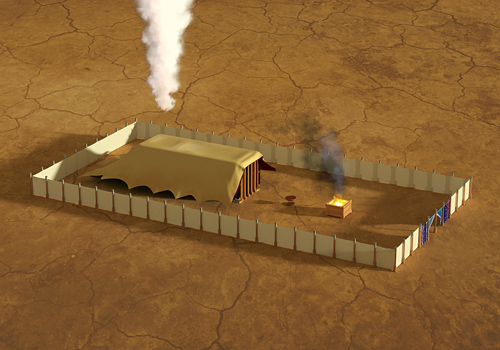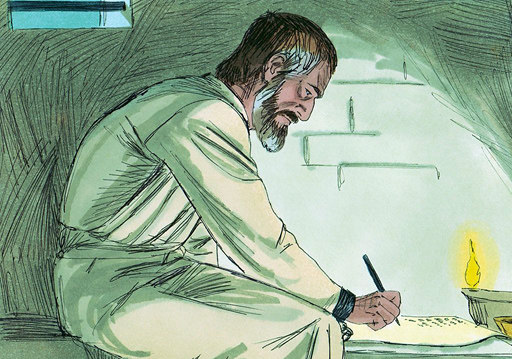Introduction to the Book of Numbers
This page is an introduction and summary for the book of Numbers in the Christian Bible. (Numbers is also in the Jewish Bible, but I'll be covering it from a Christian perspective).
I'm doing several new pages on the first five books of the Bible (the books of Moses, also called the Pentateuch), and the "former prophets" which are the books of Joshua, Judges, 1&2 Samuel and 1&2 Kings.
I'll be working on these new pages in parallel as I study for my Old Testament exam on the 10th of June, and adding to them as I study. I figured I might as well be writing my study notes up online as web pages, since now that this website is set up, it's not that much harder than just doing them in a Word document (or something like that).
Introduction to Numbers
Numbers is the fourth book of the Bible. In the Hebrew Bible this book is called "In the Wilderness". It describes the Israelites wandering in the desert, led by Moses, for 40 years. The English name of Numbers refers to two censuses of the people that were done in this period. I think the Hebrew name is better, since it better describes what the book is about and what happens in it (they wander in the wilderness for 40 years).
Before Reading or Studying Numbers
Before reading or studying the Bible, it's a good idea to take a short break — to think about where the book of Numbers came from, and how it's relevant to your own modern life right now. Christians believe that the Bible is the inspired Word of God. That is, the words in Numbers were recorded by people in the distant past, as given to them by God.
Also, the Bible is a living document — it's the living word of God. This is a foreign concept to most of our modern culture today, so it takes some time to think about, and get used to the idea of it. Many people think of God as not speaking directly to us. Yet as Christians, God does speak to us directly, in words — and the way God does this is through his words in the Bible. This means that it's directly relevant to us, personally, as we read it. As you read the words of Numbers (even if you don't really believe in this kind of stuff yet, you can still try doing this, as an experiment), imagine that God is speaking to you, personally, and directly.
Also, the Bible is an ancient document. It's very old — and the first few books of the Old Testament, especially so. A lot of things have changed since God's words were first recorded by humans. This means a lot of the Bible can be hard to understand in our modern world today. Which is why we're so lucky to have so much access to resources that can help us to understand it. As you read the words of Numbers, also imagine that you're back then, in the days when it was written. This can help a lot with understanding the meaning (of some parts of the Bible more so than others). Learning about what the words meant in their original setting is a really good place to begin trying to understand what they mean now. Keep this idea in mind as you read the rest of this web page, and as you read the Bible.
Also, the Bible is a precious document. Its true value is hard to imagine. It's probably fair to say that nearly everyone today underestimates its value — at least in the free and well-off countries, where it's very easy (and cheap) for anyone to obtain a copy of the Bible, or read it on the internet. To help get a better appreciation for the value of the Bible, think about how God's word has travelled down through the centuries, and been preserved by copyists, translators, printers, and other people. At times parts of it were lost, and then found again. In recent years, thousands of ancient copies of scrolls have been found, which were meticulously copied by hand over and over, for thousands of years. In some places and at some times, to own a copy of the Bible (or even to believe in it) would bring the death penalty. This included many of those who wrote parts of it, or were written about in it (such as the Apostles of Jesus).

Mount Sinai (Arabic: طور سيناء Ṭūr Sīnāʼ or جبل موسى Jabal Mūsá ; Egyptian Arabic: Gabal Mūsa, lit. "Moses' Mountain" or "Mount Moses"; Hebrew: הר סיני Har Sinai), also known as Mount Horeb, is a mountain in the Sinai Peninsula of Egypt that is the traditional and most accepted identification of the biblical Mount Sinai. Source: Wikipedia.
Interesting Facts About the Book of Numbers
- As God's people live "in the wilderness", they have to learn to rely on God alone for their sustenance and protection.
- On several occasions, the people do not trust God, nor obey him. This leads to some very unwelcome consequences — one large one being made to wander in the desert for 40 years. The actual journey they travelled would ordinarily take much, much less time than that (like two or three weeks perhaps).
- The idea of taking a census is often thought of as rather dull and uninteresting. However in the context of Numbers, each of the two times they take a census, it's for the purpose of enrolling (as in taking a roll call) of able and ready soldiers who are about to go to war.
- The book of Numbers is about the wilderness as a training ground or "drill field" for learning to live by trusting God.
- One relevance to life today is that we also can learn to live by the trust of God, and not by relying on human or earthly things (like money for example) to provide for the future that we think we're meant to have.
- To relate some of the things from the book of Numbers to our lives now, think of these comparisons:
- The Ark of the Covenant, which was a gold plated chest containing stone tablets of the ten commandments, is for us the Bible. As they carried the Ark before them on their travels, we can carry the Word of God with us wherever we go, and it will guide and empower us.
- The tabernacle is for us a church service, or other Christian place and gathering of worship.
- The pillar of fire in Numbers is for us the power of God's Holy Spirit which comforts and guides us.
Read Numbers
Click here to read the book of Numbers.
Click here to see Numbers in its original language of Ancient Hebrew. Or here to read Numbers in Hebrew and English side-by-side.








